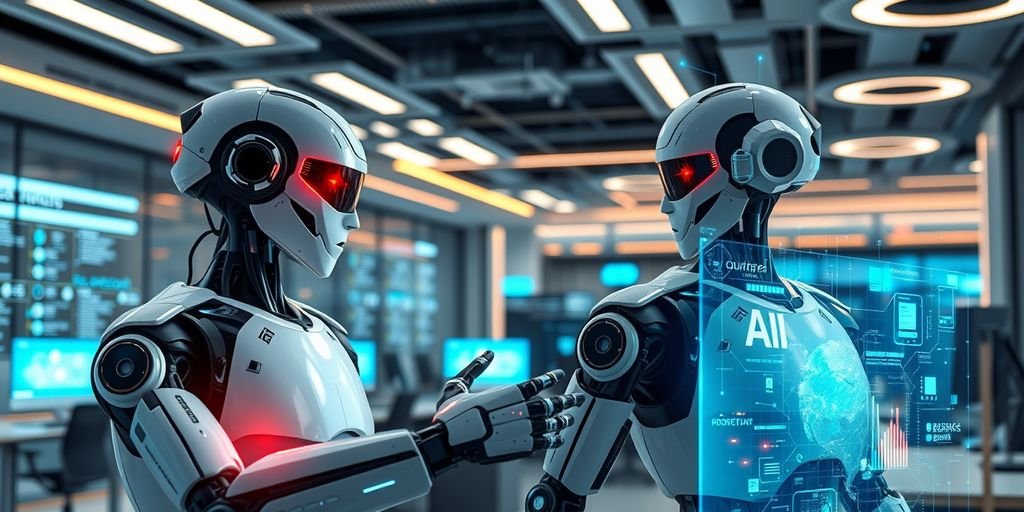AutoGPT is changing the game for business automation by using advanced AI tools. With its ability to work on its own and handle complex tasks, AutoGPT is making businesses more efficient and productive. In this article, we will look at what AutoGPT is, how to set it up in your business, the challenges it might bring, and what the future holds for this technology.
Key Takeaways
- AutoGPT is an advanced AI tool that automates complex tasks, making businesses more efficient.
- Setting up and integrating AutoGPT into existing systems can greatly enhance productivity.
- Businesses need to be aware of the challenges and ethical considerations when using AutoGPT.
Understanding AutoGPT and Its Core Capabilities
What is AutoGPT?
AutoGPT is a cutting-edge, open-source Python program that leverages OpenAI’s GPT-4 technology. It acts as an independent agent capable of performing a variety of tasks such as Google searches, website browsing, file authoring, and even initiating or terminating other GPT agents. This wide range of features showcases its potential to significantly change how we interact with AI technology. AutoGPT has quickly gained attention, amassing an impressive 44,000 GitHub stars in just seven days.
Key Features of AutoGPT
AutoGPT comes with several standout features:
- Automation: AutoGPT uses smart, automated techniques to achieve tasks without requiring extensive manual input.
- Ease of Use: Its user-friendly design means you don’t need to be a tech expert to use it.
- No Coding Experience Needed: You can build applications without being an expert coder.
- Adaptable and Versatile: It can handle tasks ranging from content creation to research.
- Time and Cost Efficiency: Automates time-consuming tasks, saving both time and money.
- Continual Improvement: AutoGPT learns and improves through feedback loops.
- Scalability: Ideal for startups and large enterprises alike, it can analyze market trends and develop strategies for scaling up.
How AutoGPT Differs from Traditional AI Tools
AutoGPT stands out from traditional AI tools in several ways:
- Proactive and Reactive Capabilities: Unlike traditional AI, AutoGPT can both react to immediate inputs and proactively plan future actions.
- Advanced Natural Language Understanding: AutoGPT excels in understanding and generating human-like text, making it highly effective for tasks requiring linguistic and contextual comprehension.
- Autonomous Operation: It can operate independently, reducing the need for constant human oversight.
- Integration with Existing Systems: AutoGPT can seamlessly integrate with various systems, enhancing its utility across different applications.
AutoGPT’s ability to function autonomously while maintaining high levels of accuracy and efficiency makes it a revolutionary tool in the field of AI.
Implementing AutoGPT in Your Business
Steps to Set Up AutoGPT
Setting up AutoGPT is straightforward. First, download the software from GitHub. You’ll need to install Python, Docker, or VSCode+devcoder. Register it with an API key from a paid OpenAI account. Once installed, launch AutoGPT and give it a goal. For example, if you’re a real estate agent, you might ask it to "write an article about digital marketing for real estate agents." AutoGPT will then gather resources and create your content.
Integrating AutoGPT with Existing Systems
Integrating AutoGPT with your current systems can streamline your operations. You can use plugins for email management, Google Analytics, and Notion. These plugins help automate repetitive tasks and organize your day. AutoGPT’s adaptability means it can fit into various workflows, making it a versatile tool for any business.
Case Studies of AutoGPT in Business Automation
AutoGPT has shown significant impact in various sectors. For instance, human resources departments can benefit from the implementation of AutoGPT and self-replicating AI agents through the automation of tasks like applicant screening. Another example is in customer service, where AutoGPT can process and analyze customer queries in real-time, providing prompt and contextually relevant responses. These case studies highlight the transformative potential of AutoGPT in business automation.
AutoGPT is not just a tool; it’s a game-changer for businesses looking to automate and innovate. With its ability to handle diverse tasks, it offers a glimpse into the future of business operations.
Challenges and Ethical Considerations
Potential Risks of Using AutoGPT
AutoGPT, like other AI tools, comes with its own set of risks. One major concern is the potential for misuse. The ability of AutoGPT to generate realistic text can be exploited to create harmful or misleading information. This raises questions about the responsibility of developers and the need for controls to prevent the creation of dangerous content, deepfakes, or manipulative material.
Ethical Guidelines for AI Implementation
Navigating the ethical landscape of AI involves addressing several key issues:
- Privacy and Data Protection: AutoGPT often requires access to large amounts of data, which can include sensitive personal information. Ensuring compliance with data protection laws and respecting user privacy is crucial.
- Bias and Fairness: AI systems learn from data, and if the data is biased, the AI’s decisions will reflect those biases. Developers must be vigilant in monitoring and mitigating bias within AI models.
- Transparency and Explainability: AI systems can sometimes operate as "black boxes," with decision-making processes that are not transparent or understandable to users. Enhancing transparency and explainability is essential for building trust.
Balancing Automation and Human Oversight
While automation offers numerous benefits, it is important to balance it with human oversight. Over-reliance on AI can lead to issues such as job displacement and a lack of accountability. Ensuring that there are systems in place to support and retrain workers is essential as jobs evolve or are replaced by machines.
Addressing these ethical considerations requires a multidisciplinary approach involving ethicists, technologists, and policymakers. Together, they must develop guidelines and standards that ensure the ethical deployment of AI technologies like AutoGPT.
Future Prospects of AutoGPT
Advancements in Autonomous Agents
AutoGPT is at the forefront of the AI revolution, with new advancements being unveiled regularly. One of the most exciting developments is the rise of autonomous agents. These AI models can perform tasks with minimal human intervention, making them a game-changer for businesses. Autonomous agents can automate tasks that were once time-consuming and labor-intensive, improving efficiency and productivity.
Predicted Trends in AI and Business Automation
The future of AutoGPT looks promising, with significant advancements expected in various sectors. As computational techniques and hardware evolve, future iterations of AutoGPT will become more efficient and capable of handling complex tasks. Key trends include:
- Personalized Applications: AutoGPT could be used in personalized education and tailored healthcare, creating customized learning experiences and treatment plans.
- Data Privacy and Ethics: Robust frameworks and regulations will be developed to govern AI deployment, addressing ethical challenges and ensuring responsible use.
- Democratization of AI: Advances in AI accessibility will allow more people to utilize these tools, leading to grassroots innovation and equitable distribution of technology benefits.
Preparing Your Business for Future AI Developments
To stay ahead, businesses need to prepare for future AI developments. Here are some steps to consider:
- Invest in AI Training: Ensure your team is well-versed in the latest AI technologies and trends.
- Adopt Flexible Systems: Implement systems that can easily integrate new AI tools and updates.
- Focus on Data Security: Prioritize data privacy and security to protect sensitive information.
- Monitor AI Trends: Keep an eye on emerging trends and advancements in AI to stay competitive.
The future landscape of AI with AutoGPT is expected to undergo substantial transitions, with potential improvements in several areas of AI technology.
By embracing these strategies, businesses can leverage the power of AutoGPT to streamline operations and stay competitive in an ever-evolving market.
Conclusion
AutoGPT is changing the way businesses operate by making tasks easier and faster. This AI tool can help with many things, like writing content, coding, and analyzing data. It saves time and lets workers focus on more important jobs. But, it’s important to use AutoGPT carefully and not rely on it too much. Businesses should stay updated with new AI developments to get the most out of AutoGPT. By using this tool wisely, companies can improve their work and stay ahead in the market. The future of business is bright with AI tools like AutoGPT leading the way.
Frequently Asked Questions
What is AutoGPT?
AutoGPT is an advanced AI tool that uses GPT-4 technology to help businesses automate tasks. It can generate text, analyze data, and even write code, making it a versatile tool for various applications.
How can AutoGPT benefit my business?
AutoGPT can save time and resources by automating repetitive tasks. It can handle customer service inquiries, create content, and assist with data analysis, allowing your team to focus on more complex tasks.
Are there any risks associated with using AutoGPT?
Yes, there are some risks. Over-relying on AI can lead to mistakes, and it’s essential to use AutoGPT ethically. Always have human oversight to ensure the AI’s actions are appropriate and accurate.



